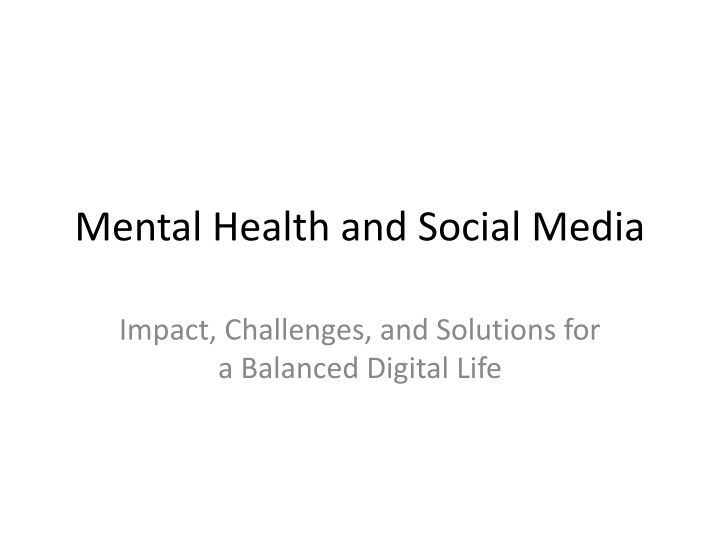
Mental Health and Social Media Impact
Explore the intersection of mental health and social media, including the challenges of self-esteem, addiction, and screen time. Learn red flags, solutions for balance, and the importance of creating safe digital spaces.
Uploaded on | 0 Views
Download Presentation

Please find below an Image/Link to download the presentation.
The content on the website is provided AS IS for your information and personal use only. It may not be sold, licensed, or shared on other websites without obtaining consent from the author. If you encounter any issues during the download, it is possible that the publisher has removed the file from their server.
You are allowed to download the files provided on this website for personal or commercial use, subject to the condition that they are used lawfully. All files are the property of their respective owners.
The content on the website is provided AS IS for your information and personal use only. It may not be sold, licensed, or shared on other websites without obtaining consent from the author.
E N D
Presentation Transcript
Mental Health and Social Media Impact, Challenges, and Solutions for a Balanced Digital Life
The Intersection of Mental Health and Social Media Social media has grown exponentially, impacting mental health in both positive and negative ways. It's vital to explore its influence, particularly among the youth, who are its most active users.
The Social Media Mirror: Self- Esteem and Body Image Social media fosters a culture of comparison, where people often compare their real life with highly curated, filtered online versions of others. This can lead to lowered self-esteem and body image issues, especially among young users. Studies show a significant correlation between time spent on image- centric platforms like Instagram and the dissatisfaction with one's body image.
Recognizing the Red Flags Signs of social media addiction include: - Obsession with likes, comments, and followers - Anxiety or stress from not being online - Disrupted sleep patterns - Mood swings based on social media interactions - Withdrawal symptoms when not using social platforms Studies show increased levels of anxiety and
Maintaining Digital Hygiene and Balance To protect mental wellbeing, practicing good digital hygiene is essential: - Curate positive content, avoid toxic posts - Set boundaries on usage time - Engage in real-world activities and relationships - Use features like 'Do Not Disturb' or 'Mute Notifications' to maintain mental peace.
Controlling Your Screen Time Limiting screen time is crucial for a healthy mind. Tools to help manage this include: - Apps like Screen Time (iOS) or Digital Wellbeing (Android) - Set app timers to limit usage of social media - Encourage tech-free time zones, such as during meals or before sleep Recommended screen time for different age groups should be followed for healthy usage.
Creating Safe Spaces: Counseling and Support Groups Victims of social media crimes or distress often need help beyond self-regulation. Setting up peer counseling, online support groups, or professional mental health counseling can provide the needed support. Such groups offer a safe space to share experiences, offer advice, and seek emotional or professional guidance.
A Balanced Digital Life is a Healthy Life To conclude, managing social media's impact on mental health is crucial. Practice digital balance, remain mindful, and seek help when needed. By setting boundaries, managing screen time, and staying informed, users can enjoy the benefits of social media without compromising their mental well-being.
